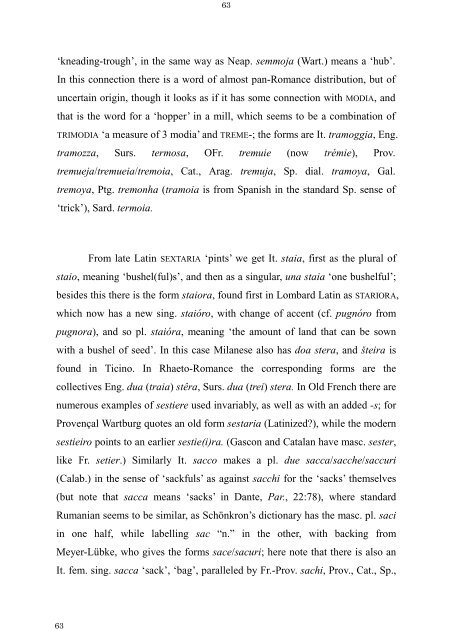The Latin Neuter Plurals in Romance - Page ON
The Latin Neuter Plurals in Romance - Page ON
The Latin Neuter Plurals in Romance - Page ON
You also want an ePaper? Increase the reach of your titles
YUMPU automatically turns print PDFs into web optimized ePapers that Google loves.
63<br />
63<br />
‘knead<strong>in</strong>g-trough’, <strong>in</strong> the same way as Neap. semmoja (Wart.) means a ‘hub’.<br />
In this connection there is a word of almost pan-<strong>Romance</strong> distribution, but of<br />
uncerta<strong>in</strong> orig<strong>in</strong>, though it looks as if it has some connection with MODIA, and<br />
that is the word for a ‘hopper’ <strong>in</strong> a mill, which seems to be a comb<strong>in</strong>ation of<br />
TRIMODIA ‘a measure of 3 modia’ and TREME-; the forms are It. tramoggia, Eng.<br />
tramozza, Surs. termosa, OFr. tremuie (now trémie), Prov.<br />
tremueja/tremueia/tremoia, Cat., Arag. tremuja, Sp. dial. tramoya, Gal.<br />
tremoya, Ptg. tremonha (tramoia is from Spanish <strong>in</strong> the standard Sp. sense of<br />
‘trick’), Sard. termoia.<br />
From late <strong>Lat<strong>in</strong></strong> SEXTARIA ‘p<strong>in</strong>ts’ we get It. staia, first as the plural of<br />
staio, mean<strong>in</strong>g ‘bushel(ful)s’, and then as a s<strong>in</strong>gular, una staia ‘one bushelful’;<br />
besides this there is the form staiora, found first <strong>in</strong> Lombard <strong>Lat<strong>in</strong></strong> as STARIORA,<br />
which now has a new s<strong>in</strong>g. staióro, with change of accent (cf. pugnóro from<br />
pugnora), and so pl. staióra, mean<strong>in</strong>g ‘the amount of land that can be sown<br />
with a bushel of seed’. In this case Milanese also has doa stera, and šteira is<br />
found <strong>in</strong> Tic<strong>in</strong>o. In Rhaeto-<strong>Romance</strong> the correspond<strong>in</strong>g forms are the<br />
collectives Eng. dua (traia) stêra, Surs. dua (trei) stera. In Old French there are<br />
numerous examples of sestiere used <strong>in</strong>variably, as well as with an added -s; for<br />
Provençal Wartburg quotes an old form sestaria (<strong>Lat<strong>in</strong></strong>ized?), while the modern<br />
sestieiro po<strong>in</strong>ts to an earlier sestie(i)ra. (Gascon and Catalan have masc. sester,<br />
like Fr. setier.) Similarly It. sacco makes a pl. due sacca/sacche/saccuri<br />
(Calab.) <strong>in</strong> the sense of ‘sackfuls’ as aga<strong>in</strong>st sacchi for the ‘sacks’ themselves<br />
(but note that sacca means ‘sacks’ <strong>in</strong> Dante, Par., 22:78), where standard<br />
Rumanian seems to be similar, as Schönkron’s dictionary has the masc. pl. saci<br />
<strong>in</strong> one half, while labell<strong>in</strong>g sac “n.” <strong>in</strong> the other, with back<strong>in</strong>g from<br />
Meyer-Lübke, who gives the forms sace/sacuri; here note that there is also an<br />
It. fem. s<strong>in</strong>g. sacca ‘sack’, ‘bag’, paralleled by Fr.-Prov. sachi, Prov., Cat., Sp.,









